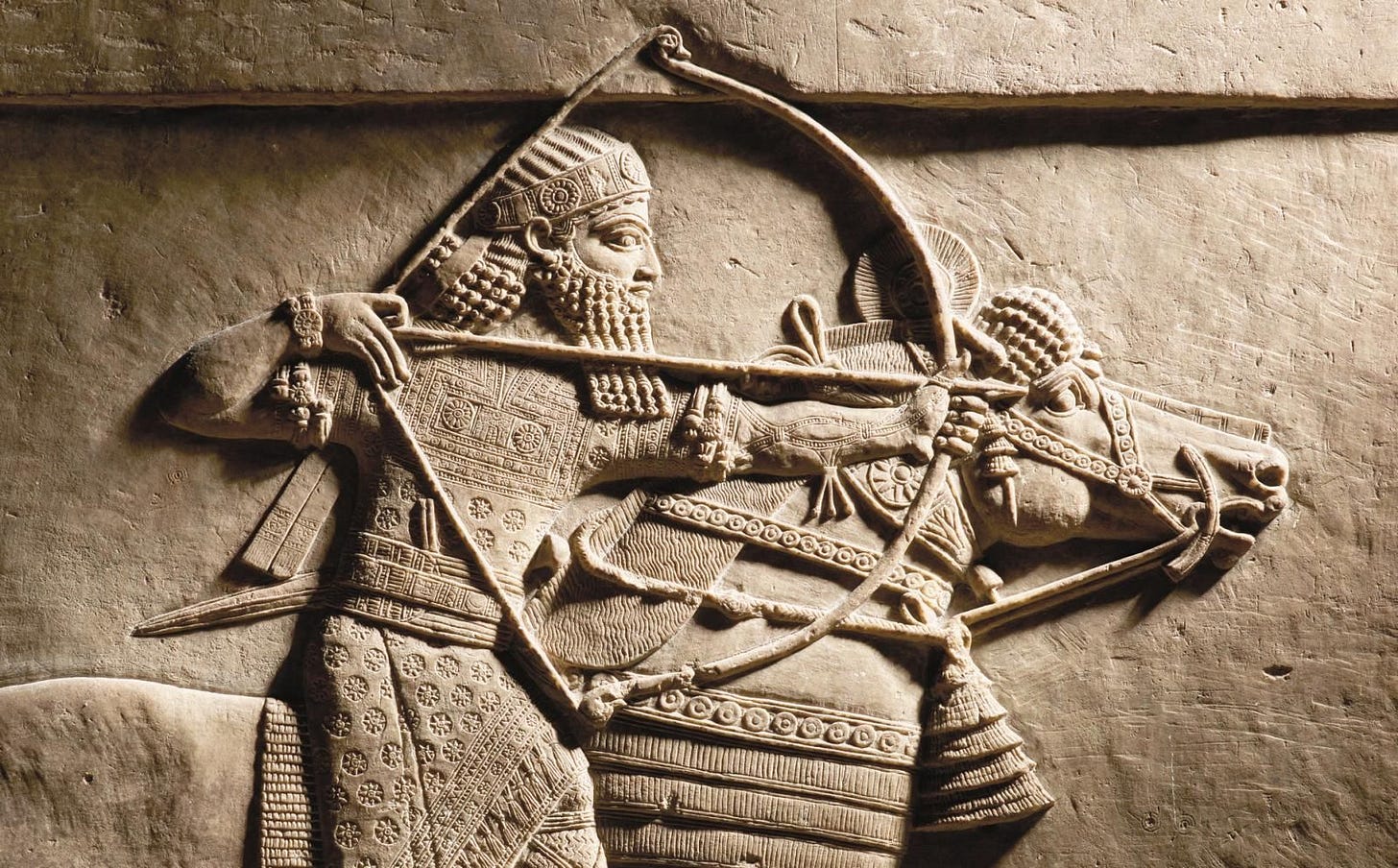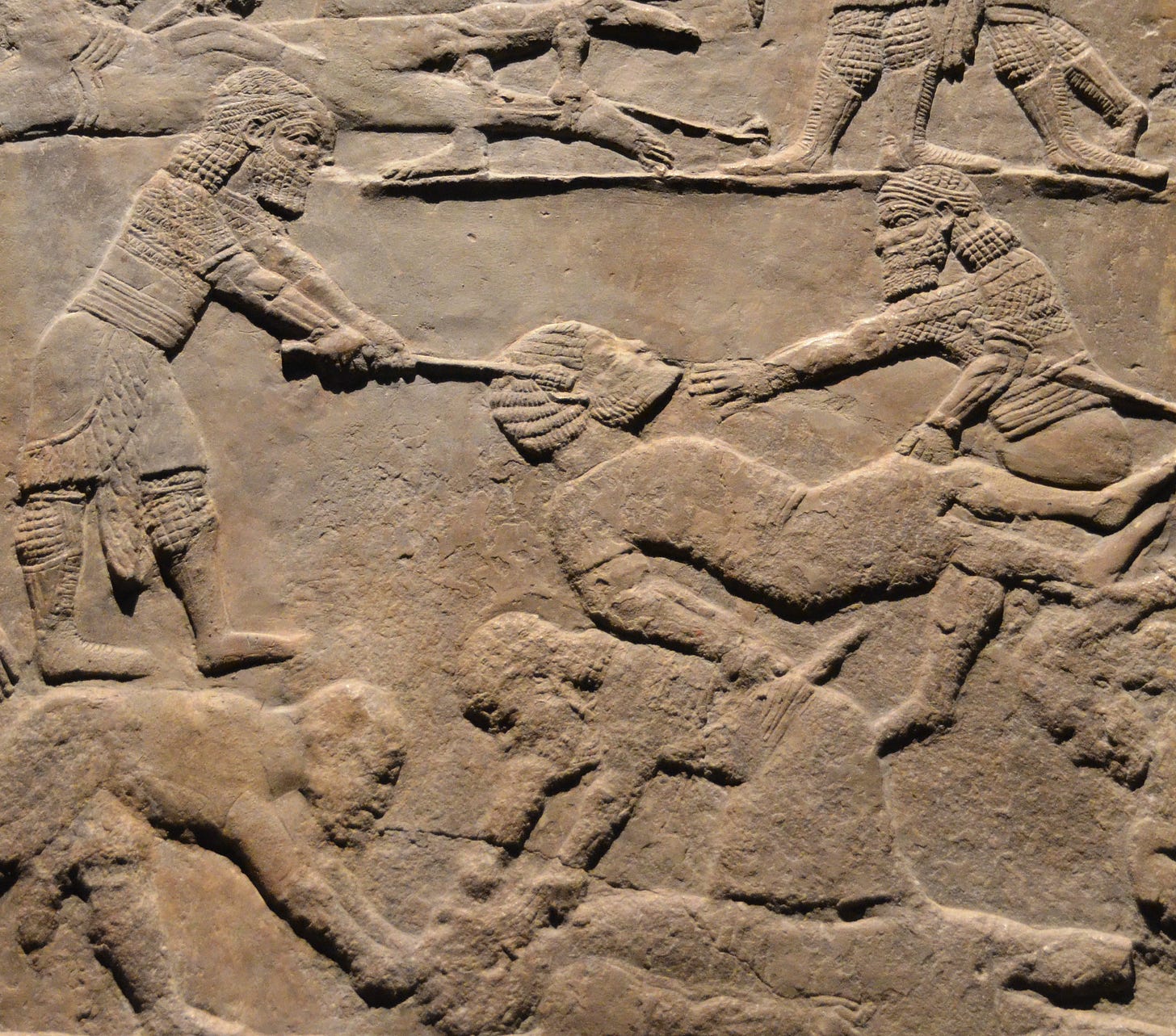I Made Him More Dead Than He Was Before
A Vignette from the Annals of Ashurbanipal
I apologize to my readers for my pen being silent for the four weeks since Christmas. I have a lot of great new content to share with you for this coming year! I appreciate your patience in bearing with me.
Sometimes, I come across things written by ancient kings that strike me as quite funny. Today, I wanted to share one such quote by Ashurbanipal (pictured below), the last great Emperor of Assyria. He was the grandson of Sennacherib, whom you know from the Bible.
King Ashurbanipal
Ashurbanipal was the second son of Esarhaddon and grandson of Sennacherib. Ashurbanipal's ascension to the throne of Assyria in 669 BC was a result of a strategic decision made by his father, Esarhaddon, around 673 BCE. Despite having an older son, Shamash-Shum-Ukin, Esarhaddon chose Ashurbanipal as his heir to the Assyrian throne, while designating his firstborn son as the heir to the throne of Babylon. This decision was likely made to prevent potential conflicts between the brothers.
Following Esarhaddon's death in 669 BCE, both brothers assumed their respective thrones simultaneously. However, it is important to note that Shamash-Shum-Ukin's position was not one of equal power. Instead, he was placed in a subordinate role, effectively serving as a closely monitored vassal to his younger brother, Ashurbanipal.
This arrangement lasted for seventeen years until Shamash-shum-ukin revolted in 652 BC.
Governor Nabu-bel-shumate
You may also remember another figure from the Bible named Merodach Baladan. He was the King of Babylon who sent messengers to Hezekiah when he fell ill. Merodach Baladan fought ongoing wars with Sargon and Sennacherib for over 23 years before finally fleeing to Elam (modern Iran). Merodach Baladan had a grandson named Nabu-Bel-Shumate who remained within the Assyrian Empire and was appointed the governor of Uruk in lower Babylonia by the Assyrian emperor, Ashurbanipal. He would prove to be the most notorious double agent of the era.
Ashurbanipal’s First and Second Wars with Elam
The Elamites had fought several wars with Assyria over the control of Babylon since the days of Sargon and Sennacherib. Twelve years before the Assyrian civil war, King Urtak of Elam launched a surprise attack against Babylonia. He was driven back into Elam and died, and was succeeded by a King named Teumman, who was not his blood relative. Teumann proceeded to slaughter his Elamite rivals, causing three sons of Urtak to flee to Assyria to take asylum with Ashurbanipal. Teumman demanded their return to Elam, but Ashurbanipal refused.
Failing to learn a lesson from the death of his predecessor, Teumman attacked Babylonia in 653 BC. Ashurbanipal came with the Assyrian Army to Babylon’s aid and fought a heated campaign against Teumman who fled back to Elam. Ashurbanipal pursued him and defeated Teumman’s forces at the Battle of Ulai near Susa (pictured below). Ashurbanipal claimed to have cut off Teumman’s head personally.
Both of the Elamite attacks on Babylonia took advantage of the fact that Ashurbanipal did not allow his brother Shamash-Shum-Ukin to have his own army in Babylon. Thus in both cases, the Babylonians suffered great losses until the Assyrian Army could be mobilized and arrive to save the day. This greatly increased the tension between the two brothers.
The Civil War Between Ashurbanipal and Shamash-Shum-Ukin
Shamash-Shum-Ukin finally revolted against his brother in 652 BC. Several of the Assyrian vassal states in Lower Babylonia joined with Babylon against Assyria. Additionally, the King of Elam supported the rebel cause with his own troops.
Governor Nabu-Bel-Shumate of Uruk, who was Ashurbanipal’s appointee, started secretly supporting the Babylonian rebels.
Ashurbanipal bitterly complained about his brother’s treachery:
In these days Shamash-shum-ukin, the faithless brother of mine, whom I had treated well and had set up as king of Babylon, – every imaginable thing that kingship calls for, I made and gave him; soldiers, horses, chariots, I equipped and put into his hands; cities, fields, plantations, together with the people who live therein, I gave him in larger numbers than my father had ordered. But he forgot this kindness I had shown him and planned evil. Outwardly, with his lips, he was speaking fair words while inwardly his heart was designing murder. The Babylonians, who had been loyal to Assyria and faithful vassals of mine, he deceived, speaking lies to them.
The Civil War lasted four years from 652 to 648 BC, until Babylon fell to the Assyrian siege. Rather than face his brother, Shamash-Shum-Ukin is traditionally believed to have committed suicide by setting himself and his family on fire in his palace.
Governor Nabu-Bel-Shumate saw the winds had changed and quickly fled to Elam.
The Final Destruction of Elam
Having regained control of Babylon, Ashurbanipal was not finished. He intended to take vengeance on the primary supporter of the rebels, the Kingdom of Elam. As his forces fought the remaining Elamite forces in Babylonia, the rogue governor, Nabu-Bel-Shumate was fighting with his own men on the Elamite side.
Nabu-Bel-Shumati continued fighting against Ashurbanipal from outposts within Elam and though the Elamite King, Humban-Haltash, was in favor of giving up the Chaldean rebel, Nabu-Bel-Shumati had too many supporters in Elam to allow this. As Humban-Haltash could thus not respond to Ashurbanipal's threats by giving up the rebel governor, the Assyrians invaded Elam again in 647 BC.
It took Ashurbanipal two years to defeat Elam. When he did, he utterly destroyed their cities and lands and took the majority of the Elamite population back to Assyria as captives. One surviving Elamite king in the hinterlands made peace with Ashurbanipal by sending the rogue governor and his shield-bearer to him. However, the two captives committed suicide together on the journey to Nineveh.
Ashurbanipal was deprived of the satisfaction of punishing the rogue, Nabu-Bel-Shumate while he was alive. But he did in the end derive some joy from desecrating the corpse. As he recorded in his annals:
As for Nabu-Bel-Shumati, the grandson of Merodach Baladan, who had violated the oath given to me, who had thrown off the yoke of my rule, who made the kings of Elam his mainstay, and had put his trust in [three kings of Elam] — filled with anger, I sent my messenger to Ummanaldash, for the surrender of Nabu-Bel-Shumati.
Nabu-Bel-Shumati, grandson of Merodach Baladan, heard the coming of my messenger as he entered Elam, and his heart became anxious, he took fright, his life seemed of no worth in his eyes, and he longed for death. He commanded his own shield-bearer, saying: “Cut me down with the sword.” He and his shield-bearer ran each other through with their iron girdle daggers.Ummanaldash was alarmed and laid the corpse of that Nabu-Bel-Shumati in salt and gave it, together with the head of his shield-bearer, who had cut him down with the sword, to my messenger, and he had him brought before me.
I did not give his body to be buried. I made him more dead than he was before. I cut off his head and hung it on the back of Nabu-kata-sabat, his twin brother and a faithful subject of Shamas-Shum-Ukin, my hostile brother, who had gone with him to Elam to hostility.





This king was mad. He seems like King Creon of Thebes from "Antigone".